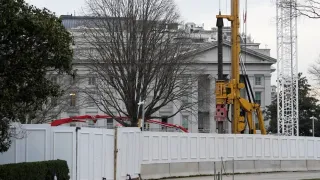May 22, 2014
Boy Scouts to Formally Confirm New President
Jason St. Amand READ TIME: 4 MIN.
Protesting the direction of the country under President Donald Trump, people will gather Saturday in the nation’s capital and communities across the U.S. for “ No Kings ” demonstrations — what the president's Republican Party is calling “Hate America” rallies.
This is the third mass mobilization since Trump's return to the White House and it is expected to be the largest. It comes against the backdrop of a government shutdown that not only has closed federal programs and services, but is testing the core balance of power as an aggressive executive confronts Congress and the courts in ways that organizers warn are a slide toward American authoritarianism.
Trump himself is away from Washington at his Mar-a-Lago home in Florida.
“They say they’re referring to me as a king. I’m not a king,” Trump said in a Fox News interview airing early Friday, before he departed for a $1 million-per-plate MAGA Inc. super PAC fundraiser at Mar-a-Lago. Protests are expected nearby Saturday.
While the earlier protests this year — against Elon Musk's cuts in spring, then to counter Trump's military parade in June — drew crowds, organizers say this one is building a more unified opposition movement. Top Democrats such as Senate Leader Chuck Schumer and Independent Sen. Bernie Sanders are joining in what organizers view as an antidote to Trump's actions, from the administration's clampdown on free speech to its military-style immigration raids.
“There is no greater threat to an authoritarian regime than patriotic people-power,” said Ezra Levin, a co-founder of Indivisible, among the key organizers.
As Republicans and the White House dismiss the protests as a rally of radicals, Levin said their own sign-up numbers are growing. More than 2,600 rallies are planned in cities large and small, organized by hundreds of coalition partners. They said rallies are being planned within a one-hour drive for most Americans.
Overseas, a few hundred Americans already gathered in Madrid to chant slogans and hold signs at a protest organized by Democrats Abroad, with similar rallies planned in other major European cities.
Republicans have sought to portray participants in Saturday’s rallies as far outside the mainstream of American politics, and a main reason for the prolonged government shutdown, now in its 18th day.
From the White House to Capitol Hill, GOP leaders disparaged the rallygoers as “communists” and “Marxists."
They say Democratic leaders, including Schumer, are beholden to the far-left flank and willing to keep the government shut down to appease those liberal forces.
“I encourage you to watch — we call it the Hate America rally — that will happen Saturday,” said House Speaker Mike Johnson, R-La.
“Let’s see who shows up for that," Johnson said, listing groups including “antifa types,” people who “hate capitalism” and “Marxists in full display.”
Democrats have refused to vote on legislation that would reopen the government as they demand funding for health care. Republicans say they are willing to discuss the issue later, only after the government reopens.
But for many Democrats, the government closure is also a way to stand up to Trump, and try to push the presidency back to its place in the U.S. system as a co-equal branch of government.
In a Facebook post, Sanders of Vermont, himself a former presidential contender, said, “It’s a love America rally.”
“It’s a rally of millions of people all over this country who believe in our Constitution, who believe in American freedom and,” he said, pointing at the GOP leadership, “are not going to let you and Donald Trump turn this country into an authoritarian society.”
The situation is a potential turnaround from just six months ago, when Democrats and their allies were divided and despondent, unsure about how best to respond to Trump's return to the White House. Schumer in particular was berated by his party for allowing an earlier government funding bill to sail through the Senate without using it to challenge Trump.
In April, the national march against Trump and Elon Musk had 1,300 registered locations. In June, for the first “No Kings” day, there were 2,100 registered locations. The march Saturday will have more than 2,600 registered locations, Levin said.
“What we are seeing from the Democrats is some spine,” Levin said. “The worst thing the Democrats could do right now is surrender.”
House Democratic Leader Hakeem Jeffries said he wasn't sure if he would join the rallygoers Saturday, but he took issue with the Republicans' characterization of the events.
“What’s hateful is what happened on January 6th," he said, referring to the 2021 Capitol attack, as Trump's supporters stormed the building to protest Joe Biden's election victory. “What you’ll see this weekend is what patriotism looks like, people showing up to express opposition to the extremism that Donald Trump has been unleashing on the American people.”






